What's Happening?
A fragile ceasefire is currently holding in Gaza, raising urgent questions about the territory's future governance, security, and reconstruction. The ceasefire agreement stipulates that Hamas will no longer govern Gaza, leaving the territory without clear
leadership. A committee of Palestinian technocrats is proposed to manage Gaza temporarily, with names approved by Hamas and Israel, although their authority and resources remain uncertain. The security situation is volatile, with Hamas civilian police clashing with armed gangs. Egypt is training new Palestinian policemen, but their deployment and acceptance by Hamas are unclear. Reconstruction efforts face significant challenges, with the UN estimating costs at $70 billion. President Trump expects wealthy Arab states to fund the rebuilding, but no commitments have been made yet.
Why It's Important?
The situation in Gaza is critical for regional stability and international relations. The governance vacuum and security volatility could lead to further unrest, affecting neighboring countries and international stakeholders. The reconstruction of Gaza is a massive undertaking that requires substantial financial support, which could strain relations between donor countries and the region. The involvement of wealthy Arab states in funding reconstruction could shift geopolitical dynamics, influencing their diplomatic ties with both Israel and Palestine. The ceasefire's success and the subsequent governance structure will impact humanitarian efforts and the daily lives of Gaza's 2 million residents, highlighting the importance of international cooperation and effective leadership.
What's Next?
The next steps involve the establishment of the interim committee to govern Gaza, with potential challenges in asserting authority and managing resources. The deployment of newly trained Palestinian policemen by Egypt could alter the security landscape, depending on Hamas's acceptance. Reconstruction efforts will require coordination among international donors, with President Trump advocating for Arab states' financial involvement. The success of these initiatives will depend on political negotiations and the willingness of stakeholders to collaborate for Gaza's stability and development.
Beyond the Headlines
The situation in Gaza presents ethical and humanitarian challenges, as the territory's residents face dire living conditions. The international community's response to the reconstruction efforts will reflect broader geopolitical interests and humanitarian priorities. The potential disarmament of Hamas raises legal and ethical questions about sovereignty and the use of force. Long-term stability in Gaza will require addressing underlying political tensions and fostering sustainable development, which could influence future peace negotiations in the region.















